| 1 |
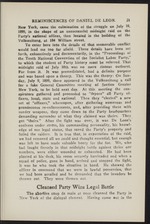 |
“...was theirs. They
got "theirs. After the fight was over, it was De Leons
coolness under stress, his commanding personality, his knowl-
edge of our legal status, that saved the Partys property and
foiled the raiders. It is true that, in expectation of the raid,
we had removed all we could and thought essential, but enough
was left to have made valuable booty for the foe. We, who
had fought fiercely in that midnight battle against thrice our
numbers, were either wounded or exhausted. He had been
planted at his'desk, his room securely barricaded and when a
squad of police, guns in hand, arrived and stopped the fight,
it was he who took the situation in hand. He showed the
officer in command that we were in lawful possession, that
we had been assailed and he demanded that the invaders be
thrown out. They were thrown out.
Cleansed Party Wins Legal Battle
The abortive coup de main at once cleansed the Party in
New York of the disloyal element. Having come out in the...”
|
|
| 2 |
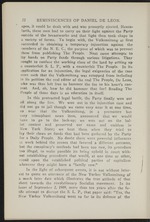 |
“...members of the N. E. C., the purpose of which was to prevent
them from publishing The People. Next came attempts to
lay hands on Party funds through various litigations. They
sought to confuse the working class of the land by setting up
a counterfeit S. L. P., with a counterfeit The People. In its
application for an injunction, the legal exigencies of the case
were such that the Volkszeitung was estopped from including
in its petition the real editor of the real The People, De Leon,
who was thus left free to hammer the foe to his hearts con-
tent. And, oh, how he did hammer that foe I Reading The
People of those days is an education in itself.
In this protracted legal battle, the Party finally won out
all along the line. We won out in the injunction case and
did not go to jail though we came very near it at one time,
so near that the Volkszeitung, in a premature but
very triumphant news item, announced that we would
have to go to the lock-up; we won out on the bal-
lot contest and preserved...”
|
|
| 3 |
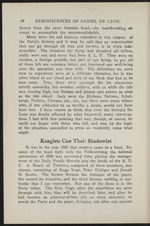 |
“...but there were many others
who, if not subjected to so terrific a strain, would not have
been lost. I have reason to think that even the intrepid De
Leon was deeply affected by what happened, many conversa-
tions I had with him pointing that way, though, of course, he
could not linger with those who fell, and was, by the logic
of the situation, compelled to press on resolutely, come what
might.
Kanglcts Cast Their Shadowlct
It was in the year 1902 that matters came to a head. Be-
cause of the legal fight with the Volkszeitung, the national
convention of 1900 was prevented from placing the manage-
ment of the Daily People directly into the hands of the N. E.
C. A Board of Trustees, composed of three members, was
chosen, consisting of Hugo Vogt, Peter Fiebiger and Joseph
H. Sauter. The former became the manager of the paper,
the second its treasurer, and the third became nothing in par-
ticular that I can remember. Not one of the three is in the
Party today. The first, Vogt, after the experience...”
|
|
| 4 |
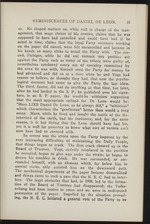 |
“...the Daily People,
that things began to crack. The first crack showed up in the
Board of Trustees. Vogt, entirely misplaced in the position
he occupied, began to give way under the strain; he began to
drown his troubles in drink. He was surrounded, or sur-
rounded himself, with an element which, far below him in
mental status, ably assisted him on the downward path.
he mechanical department of the paper became demoralized
and things came to such a pass that the N. E. C had to inter-
fere. The legal obstacles that had, in 1900, led to the forma-
tion of the Board of Trustees had disappeared; the Volks-
zeitung had been beaten in court and we were in undisputed
possession of the paper. Impelled by the situation prevail-
ing, the N. E. C, initiated a general vote of the Party to so...”
|
|
| 5 |
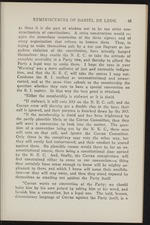 |
“...LEON. 45
as these it is the part of wisdom not to be too strict con-
structionists of constitutions. A strict construction would re-
quire the immediate suspension of the three signers and of
every organization that refuses to bounce them. They, in
trying to make themselves safe by a not too flagrant or im-
pudent violation of the constitution, have actually hanged
themselves: they enable the N. E. C. to take the attitude of
complete neutrality in a Party row, and thereby to afford the
Party a legal way to smite them. I hope the tone in your
Warning was a mere outburst of just and excusable indigna-
tion, and that the N. E. C. will take the course I map out:
Condemn the R. I. method as unconstitutional and unwar-
ranted, and at the same time submit to the membership the
question whether they care to have a special convention on
the R. I. matter. In that way the best good is obtained.
Either the membership is stalwart or it is timid.
If stalwart, it will vote NO on the N. E. C. call; and the...”
|
|
| 6 |
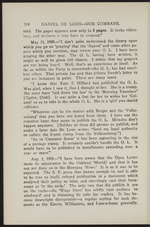 |
“...I thought of her. She is a trump.
She must have laid down the law to the Morning Examiner
[Ogden, Utah], It was quite a feat for her to widen her Col-
umn so as to take in the whole O. L. She is a girl you should
cultivate.
Whatever can be the matter with Berger and the Volks-
zeitung that you have not heard from them. I have not the
remotest hope they mean to publish the O. L. Miracles don t
happen anymore. [Neither of them did answer or publish, and
under a later date De Leon wrote; Send me legal authority
to collect the 2-cent stamp from the Volkszeitung.]
As to Common Sense it has been appearing in the size
of a postage stamp. It certainly couldnt handle the O. L. It
would have to be published in installments extending over a
year or more.
Aug. 1, 1909.I have been aware that the Open Letter
made its appearance in the Oakland World, and that it has
not yet done so in the Montana News. It is as it was to be
expected. The S. P. press that knows enough to, and is able
to be true to itself...”
|
|
